Bill Walsh's Blog, page 2
December 1, 2015
Acknowledging the Inevitable

It wouldn't be much of an exaggeration to say that I built a (not-very-lucrative) second career on hatred of the email spelling of e-mail, or to say that the peeve I petted the most was the mic spelling of mike.
But back in my first career, the one that pays the bills, it's not about me. And so, as my Washington Post colleagues and I prepared to move out of the building where I've worked for nearly 19 years, I decided this time of change would be a good time to propose some style updates. My bosses had no objection, so the change is coming. The following is from an e-mail (yes, I'm still using the hyphen on my own time) that I sent to the newsroom. The newsroom was, uh, pretty happy about it. It's probably safe to say this is the most popular e-mail I will ever send.
Important changes in Post style (effective Sunday)
Greetings! Just in case you don’t have enough upheaval to deal with in the coming weeks, we have some significant stylebook updates to announce. In some cases, we are catching up with changes that many other publications and news organizations have already made. We had good reasons for standing our ground, but usage goes where it wants to go, and the older practices were no doubt increasingly distracting to readers.
Please read over the following and incorporate them into your writing and editing effective with editions of the coming Sunday, Dec. 6.
emailNo hyphen in email, emails, emailed, emailing, emailer, etc., in a change from long-standing Post style. Capitalize at the beginning of a sentence. Other e- formulations get hyphens: e-commerce, e-books, e-learning.
websiteUse website, not Web site, in a change from long-standing Post style. Retain capitalization of Web when it’s used alone as short for World Wide Web. Also: Web page, not webpage, but webcam, webcast, webmail, webmaster.
website addressesIn short (the stylebook entry will be longer), there is no longer any need to use www. with Web addresses unless the prefix is required to make them work. We long ago discarded http:// -- again, except in the rare cases where a site did not work without it (it will sometimes be necessary to specify https:// when we’re talking about the secure version of a site that doesn’t automatically apply that prefix).
micNot mike, in a change from long-standing Post style, as the short form for microphone. Try to avoid inflected verb forms, but use apostrophes and write mic’ed and mic’ing if they must be used.
Iraq WarCapitalize War, in a change from long-standing Post style. Use the wars in Iraq and Afghanistan or similar wording to avoid juxtaposing a capitalized Iraq War and a lowercase Afghanistan war.
WalmartUse this spelling for the stores and, in general, the company and its affiliated entities. Post style is generally not to use corporate identifiers, but use the Wal-Mart spelling if it is necessary to spell out Wal-Mart Stores Inc.or any unit of the company that uses that spelling in official filings.
ExxonMobilUse this spelling, without a space, except in formal references to Exxon Mobil Corp. (Post style is generally not to use Corp. and other corporate identifiers.)
TV and radio stationsWe are relaxing our insistence on old-fashioned call letters and allowing the use of branded names such as NBC4.
they, their, etc.It is usually possible, and preferable, to recast sentences as plural to avoid both the sexist and antiquated universal default to male pronouns and the awkward use of he or she, him or her and the like: All students must complete their homework, not Each student must complete his or her homework.
When such a rewrite is impossible or hopelessly awkward, however, what is known as “the singular they” is permissible: Everyone has their own opinion about the traditional grammar rule. The singular they is also useful in references to people who identify as neither male nor female.
Published on December 01, 2015 13:09
November 19, 2015
Thoughts on 'Headline Names.' Or, What on Earth is a 'Magaziner'?
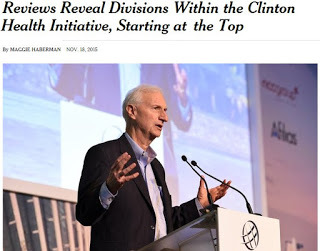
During Bill Clinton's first term as president, I was not yet at The Washington Post. I worked at another news organization -- one that was, shall we say, extremely interested in the inner workings of the administration. One night I was working on a story that involved a Clinton adviser named Ira Magaziner (shown above in a New York Times article that reminded me of all this), and the headline said something like "Clinton aide blah blah blah." The top editor was not happy with this headline, and he told us to change it to "Magaziner blah blah blah." Specificity is good, he said.
He's right that specificity is good. "Clinton health-care adviser Ira Magaziner blah blah blah" or "Clinton health-care adviser Magaziner blah blah blah" or even "Clinton aide Magaziner blah blah blah" would have been better, but there was no room to get that specific. So we could call the guy "Clinton aide" or we could call him "Magaziner."
There's a concept in big-time journalism called "headline names." It's pretty simple: Will most readers know who you're talking about if you put that name in a headline? Making that determination is an art, not a science, and it involves questions of familiarity, ambiguity and context. "Magaziner" failed on all three counts. No matter what my bosses may have thought, the vast majority of readers were not so obsessed with the Clinton White House that they would have recognized that name. So much for familiarity. The ambiguity problem usually takes a different form: For instance, which "Clinton" are we talking about? The same editor who insisted on "Magaziner" once told me to change "lawmaker" to "Smith," or some other very common name, in a reference to an obscure congressman. That's a great example of more specific being less specific -- yes, "Rep. Hypothetical J. Smith, a Republican representing California's 17th Congressional District," would be more specific, but "Smith"? Nope. Smiths outnumber lawmakers by a wide margin.
With "Magaziner," especially in an up-style headline (major words capitalized) or, in this case, at the start of a headline, the problem is a name that combines bizarre rarity with misdirection. What the hell is a magaziner? Verb, intransitive, "one who magazines"? Are we referring to Jann Wenner? Anna Wintour? Henry Luce? Hugh Hefner, Bob Guccione, Larry Flynt? Those kids who go door to door asking you to buy cut-rate subscriptions to subsidize their school trips?
If the name had been Blumenthal or something, or Magaziner's name had been in a spot where its proper-noun capitalization had been obvious, context would have probably made the non-headline name fine. The "blah blah blah" was no doubt something about advising the president, and so one could infer that we were talking about a presidential adviser and not somebody having something to do with magazines. You could argue that readers would have figured this out with Magaziner as well, but I don't know. I'm still thinking it's Hef.
Published on November 19, 2015 08:23
April 15, 2015
The List
Reach out.Walk back.Slow-walk.Pushback.Call out.Hot mic.Hot take.
Published on April 15, 2015 11:18
May 30, 2014
How to Be a Good Recruit/Tryout/Intern/Newbie
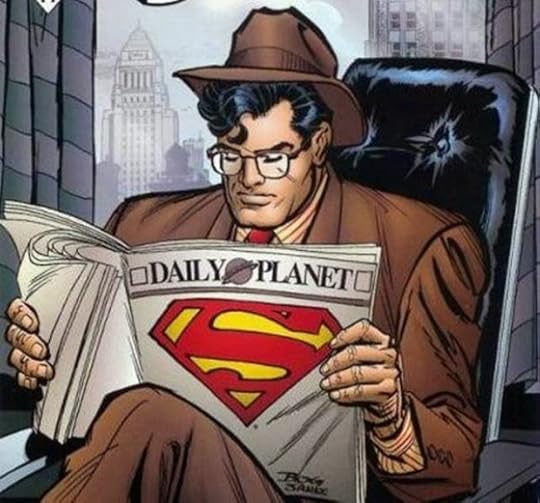
Believe it or not, there is new content on The Slot! In How to Be a Good Newbie, I present 20 questions for anyone trying to get hired as a copy editor — or already hired and trying to make a good impression.
A lot of these are questions you'll have to ask, but some of them you had better be able to figure out yourself.
Published on May 30, 2014 10:02
May 26, 2014
A Couple of Interviews
Published on May 26, 2014 07:51
April 2, 2014
So Far
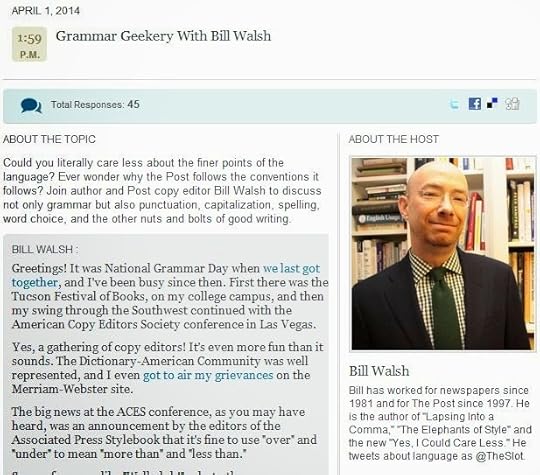
Since August 2013, I've been doing a monthly chat on Washingtonpost.com. ICYMI, here's an archive:
June 1, 2016
The chat.
May 4, 2016
The chat.
April 6, 2016
The chat.
March 2, 2016
The chat.
Feb. 2, 2016
The chat.
Jan. 1, 2016
The chat.
Dec. 1, 2015
The chat.
Nov. 3, 2015
The chat.
Oct. 6, 2015
The chat.
Sept. 1, 2015
The chat.
Aug. 4, 2015
The chat.
July 7, 2015 The chat.
June 2, 2015 The chat.
May 5, 2015 The chat.
April 7, 2015 The chat.
March 3, 2015 The chat.
Feb. 3, 2015 The chat.
Jan. 6, 2015 The chat.
Dec. 2, 2014 The chat.
Nov. 11, 2014 Did you go to Wal-Mart this summer, or Walmart last summer?
Oct. 7, 2014 Have "vanished" and "disappeared" gone missing?
Sept. 2, 2014 [T]his [w]ill [n]ot [s]tand.
July 1, 2014 Is it "get off my lawn"? Get-off-my-lawn? Getoffmylawn?
June 3, 2014 About the the, if not The The.
May 1, 2014 The data is (are?) in on mistresses..
April 1, 2014 "Over" vs. "more than," and a little mojibake.
March 4, 2014 It's Grammar Day! We lay, and we lie.
Feb. 4, 2014 After Superb Owl Sunday, we tackle the singular "they."
Jan. 7, 2014 A capital idea about logo-philia.
Dec. 3, 2013 In which I rant about "Black Friday."
Nov. 5, 2013
A modest proposal for the National Natural Resources Defense Council.
Oct. 1, 2013 If I'm going to be miked, it sure as heck won't be with a "mic."
Aug. 29, 2013 The first in a series, literally.
Published on April 02, 2014 09:01
March 31, 2014
Madness!
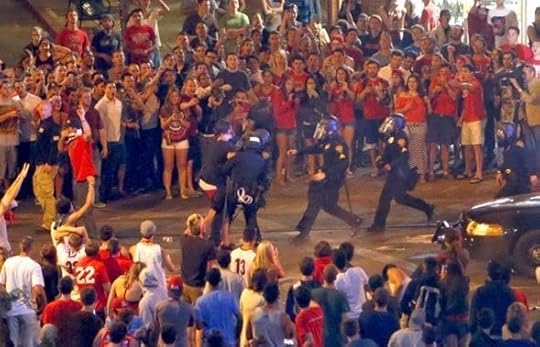
Ben Zimmer's informative Visual Thesaurus post on the NCAA men's basketball tournament and its "brackets" and other lingo reminded me of the much less useful post of peeves I've had in mind for some time.
If you're inferring that the subject makes me a bit crotchety because I simply don't like basketball, well, you may have a point. But I do pay attention to my alma mater's exploits in the tournament. The photo above is from the Arizona Daily Star -- that would be the riot that followed my Wildcats' one-point overtime defeat the other day. (And I'm not at all bitter that, after years of loyally picking Arizona to win, I forgot to enter a pool in 1997, the year the Cats actually did win.)
Anyway, here are some things that irk me about what we talk about when we talk about March Madness:
1. "Brackets" are not unique to this event. It's a draw sheet. Every single-elimination tournament has one.
2. The infantile alliteration. March Madness. Final Four. Elite Eight. Sweet Sixteen. Thirsty Thirty-Two? Sardonic Sixty-Four? Oh, and let's not forget Selection Sunday. Selection Sunday? (I prefer Secretarial Saturday Sponsored by Staples, but then again I'm a sucker for office supplies.)
3. Final Four! Final Four! Translation: "It's the semifinals! The SEMIS, I tell you!"
4. The "regions" are not regions, unless some sort of seismic activity shifted Albany to the South since I last looked.
5. The not-regions "regions" confuse things. Tell me what round it is, not what round of a meaningless sub-round. If the regions have nothing to do with regions, and each so-called region produces not an actual winner but rather a semifinalist, how much more confusing and/or meaningless can you get than "regional quarterfinals"?
6. A caveat: While the "regions" present me with a math problem in lieu of actual informatiion, at least the infantile alliteration tells me where things stand.
UPDATE (can't believe I forgot this)
7. You get only one No. 1 seed, unless the "regionals" are separate tournaments. The regionals are neither regionals nor separate tournaments (see No. 4). Therefore, the best No. 1 seed is No. 1, the second-best is No. 2, and so on.
Published on March 31, 2014 08:36
September 20, 2013
At Least My Shoes Are Oxfords

In what I can only assume was an exaggerated-for-comic-effect
With a straighter face, he asserts that "right-thinking usage nerds everywhere" dutifully use that comma. Red, white, and blue, not red, white and blue. Well, I'm as right-thinking a usage nerd as you'll meet, if I do say so myself, and although I'll concede in in the minority, I just don't care much about serial commas one way or the other. Neither do my right-thinking-usage-nerd friends Merrill Perlman and John McIntyre.
I've spent my career in newspapers, which generally omit the serial comma, and perhaps that's why I lean slightly in that direction even when I'm off the clock.
Fans of the serial comma will point to comical examples such as "my parents, Ayn Rand and God" to demonstrate how its absence can create ambiguity. But, as many before me have pointed out, you can just as easily come up with an example of the comma's presence creating ambiguity. Think of "my mother, Ayn Rand, and God."
Fans of the serial comma will say "Crosby, Stills and Nash" inappropriately pairs Stills with Nash while leaving Crosby isolated, as if he's in prison or something. I would counter that "Crosby, Stills, and Nash played last night" carries a whiff of Nash alone playing. I'm mentioning Crosby for some reason, I'm mentioning Stills for some reason, and then, in an unrelated matter, I'm informing you that Nash played last night.
Yes, I'm reaching. But so are the Oxfordian serialists and their divine libertarian parents.
Oh, and there is an asterisk. There's always an asterisk. Even the anti-serial-comma Associated Press Stylebook uses serial commas in series that contain at least one embedded conjunction. You should, too. She worked for the departments of State, Labor, and Health and Human Services. AP also reserves the right to use a serial comma when sentences get complex, and that's also a good idea. If each clause in a series could stand alone as its own sentence, use that comma: I've worked at this place for 20 years now, I'm tired of it, and I'm going to quit.
Published on September 20, 2013 08:00
August 26, 2013
Uniquely, Qualified
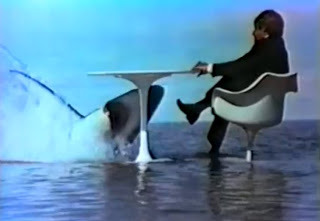
One of the kind readers who e-mailed me after my article about the figurative literally appeared in the Washington Post’s Outlook section was complimentary but added that I had misused the word uniquely.
Now, I know the drill on unique. It means one-of-a-kind, and so it’s absolute: More unique and less unique and very unique bring to mind a little bit pregnant. That reality tends to be translated into a copy-editing “rule” along the lines of “Never precede unique with a modifier.”
As with many of the so-called rules that we copy editors love, it’s a good idea to learn the rest of the story. Yes, I am the Paul Harvey of copy editing.
More and less unique are out, all right, but how about truly unique? Or unquestionably unique? In both cases, the adverbs refer not to degrees of uniqueness but rather to whether it is accurate to apply unique at all. Absolutely no problem there. Not all modifiers are literally modifying.
And if unique is one-of-a-kind, why can't one thing that's two- or three-of-a-kind be almost unique or nearly unique or virtually unique? Again, the sanctity of unique is preserved. Such a thing isn't unique at all, but there's nothing wrong with talking about how it approaches uniqueness.
When I was too young to drink malt liquor, Colt 45 was "a completely unique experience." As opposed to partially unique? That sounds dodgier, but an experience can be partially unique, can't it, if four out of five of its elements are one-of-a-kind?
I would even be open to look the other way at preceding unique with those Upper-Class Twit of the Year hmph-modifiers that don’t really mean anything: most unique, quite unique. Maybe. It might depend on my mood at the time.
So, with all this in mind, I went back and looked at what I had written about literally. Had I slipped? Did I miss an editor’s misguided insertion? Here’s what I saw:
However persuasive the historical and linguistic justifications, there’s something uniquely absurd about using the one word that most clearly means “I am not making this up” when you are, in fact, making something up.
That seems straightforward enough: I’m asserting that the figurative literally occupies a unique place in the language. I could be wrong about literally, but I am using unique correctly.
I wondered, then, whether the reader’s observation was an example of the “impact” effect, to use a term I just made up. In an extreme version of ignoring my Paul Harvey caution, some people, many of them copy editors, decide that any word with any disputed senses must be avoided altogether. If it makes sense to avoid the biz-speak-y “The economy impacted sales,” one must also avoid “The economy had an impact on sales”! Perhaps there are those who think that if very unique is bad, unique must always be bad.
That’s literally, if not uniquely wrong-headed.
Remember: There’s usually the rest of the story. Good-day?
Published on August 26, 2013 06:38
July 1, 2013
See Me, Hear Me
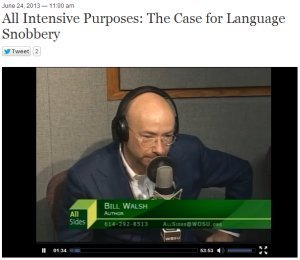
Radio interviews are now, for all intents and purposes, TV interviews as well. So you can watch as well as listen to my recent appearance on WOSU's "All Sides With Ann Fisher." I had a lot of fun; the hour went too fast.
Published on July 01, 2013 08:28
Bill Walsh's Blog
- Bill Walsh's profile
- 29 followers
Bill Walsh isn't a Goodreads Author
(yet),
but they
do have a blog,
so here are some recent posts imported from
their feed.




